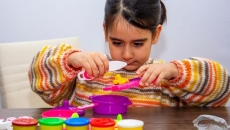New Delhi, Nov 13 (IANS) Feeding your children with powdered milk and cereals may make them significantly vulnerable to the risk of diabetes later in life, warned health experts on Wednesday, ahead of World Diabetes Day.
World Diabetes Day is celebrated every year on November 14, and the theme this year is “Breaking Barriers, Bridging Gaps”.
India is known as the diabetes capital. The country is home to an estimated 77 million people with diabetes and 25 million prediabetic.
Besides environment and genes, lifestyle factors play a huge role in the onset and progression of the disease. And it begins from the womb, said experts.
“If we reduce sugar intake during pregnancy and early life, we are reducing the risk of diabetes, blood pressure, and other metabolic diseases later in life,” Dr. Ambrish Mithal, Chairman & Head - Endocrinology & Diabetes, Max Super Speciality Hospital, Saket, told IANS.
“Our bodies get programmed according to the environment that we are in utero. These are epigenetic phenomena, which are added on to our genetic predisposition, especially during intro uterine life,” he added.
A recent study, published in the journal Science, showed that children who were in the womb or born during times of sugar restrictions during their first 1,000 days after conception had up to 35 per cent lower risk of developing Type 2 diabetes.
While exposure to limited sugar before birth was enough to lower risks, continued sugar restriction after birth increased the benefits, revealed the study.
“The role of processed diets, mainly powdered milk, and cereals, in a baby's early nutrition loaded with refined sugars and carbohydrates is known to take a toll on the child's metabolic health. Early exposure to such ingredients may spike blood glucose in later life,” Dr Shashank Joshi, Consultant Endocrinologist, Lilavati Hospital Mumbai, told IANS.
“Processed diets including powdered milk and cereals contain sugar. Nutrition during early infancy and childhood can impact our propensity to develop metabolic disorders later in life. Hence, consumption of processed food including powdered milk and cereals could contribute significantly to the development of diabetes and other metabolic diseases later in life,” added Mithal.
According to the World Health Organization (WHO), no processed diet including powdered milk and cereals for babies and added sugars for children up to 2 years is advisable.
“After six months, when solid foods are introduced, it's essential to be mindful of sugar's impact on the child’s body. Children over the age of 3 should avoid added sugars entirely,” Joshi said.
“This means no sweetened snacks or drinks, as even natural sources like fruit juices can contribute excess sugar that's not necessary at this stage,” he noted.
The experts said fresh fruits can satisfy children’s sweet cravings while also providing vital nutrients and fibre.
They also advised parents to avoid giving sugary treats such as snacks, candies, pastries, chocolates, and ice creams to the children right from the beginning. This will help the kids to avoid sugar or eat in lower quantities.
It is better to keep a tab on the child’s sugar consumption to ensure he/she doesn’t eat too much sugar. Instead, introduce children to healthier options such as dates, dry fruits, and fruits in controlled proportions, the experts noted.






